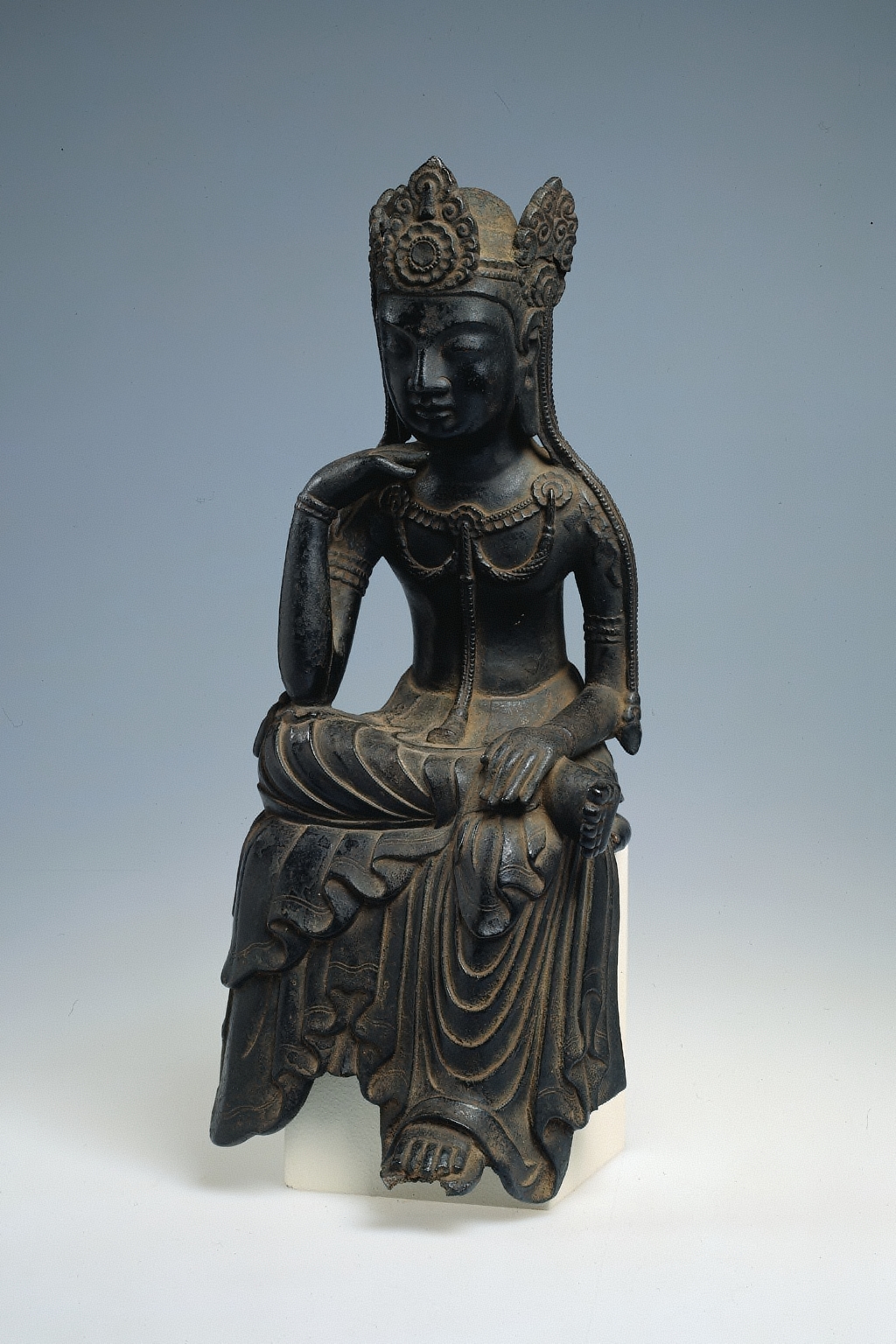Right Thought
Subscribe to this topic via: RSS
Thoughts of renunciation, good will, and harmlessness.

A contemplative statue of Maitreya: the future Buddha. In Buddhism, thought is "right" or "wrong" by the kinds of words, deeds, and life such thinking leads to. (Japanese Bronze, c. 7th c. Photo courtesy of The Cleveland Museum of Art)
Table of Contents
Books (18)
Featured:
-
This works focuses on the eight principles that the Buddha gave to Mahāpajāpatī Gotamī in the Saṅkhitta Sutta and further elcuidates them with other teachings and stories from throughout the Pāli Canon
See also:
Canonical Works (118)
Featured:
-
⭐ Recommended
You should not cultivate the kind of person who causes unskillful qualities to grow while skillful qualities decline. And you should cultivate the kind of person who causes unskillful qualities to decline while skillful qualities grow.
-
⭐ Recommended
And how is a mendicant not skilled in characteristics? It’s when a mendicant doesn’t understand that a fool is characterized by their deeds
-
⭐ Recommended
Kālāmas, do not go by oral tradition, by lineage of teaching, by hearsay, by a collection of scriptures, by logic…
-
Those who fall back on God’s creative activity as the essential truth have no desire to do what should be done and to avoid doing what should not be done…
-
⭐ Recommended
… these four things are unthinkable. They should not be thought about
-
⭐ Recommended
When a mendicant is committed to development, they might not wish: ‘If only my mind was freed from the defilements by not grasping!’ Even so, their mind is freed…
-
… heaping sand in a bucket, sprinkling it thoroughly with water, and pressing it out. But by doing this, they couldn’t extract any oil, regardless of whether they made a wish
-
Recounting his own experiences developing meditation, the Buddha explains how to understand harmful and harmless thoughts, and how to go beyond thought altogether.
-
It’s like the moon in the waxing fortnight. Whether by day or by night, its beauty, roundness, light, and diameter and circumference only grow. In the same way, whoever has faith, conscience, prudence, energy, and wisdom when it comes to skillful qualities can expect growth, not decline, in skillful qualities, whether by day or by night.
-
A faithful laywoman would rightly aspire: ‘May I be like the laywomen Khujjuttarā and Veḷukaṇṭakī, Nanda’s mother!’
-
The Buddha smiles and tells the story of a true spiritual leader.
-
The people of Sunāparanta are wild and rough, Puṇṇa. If they abuse and insult you, what will you think of them?
-
Monk, don’t be bitter. If you’re bitter, corrupted by putrefaction, flies will, without a doubt, plague and infest you.
-
He himself abstains from lying but doesn’t encourage others in undertaking abstinence from lying.
-
Bhikkhus, two thoughts often occur to the Tathāgata…
-
Mendicants, sensual, malicious, and cruel thoughts arise for a reason…
-
If evil unwholesome states that have arisen in me are not abandoned, this may lead to my harm.
-
With the fading away of ignorance and the arising of true knowledge, ‘I am’ does not occur to him; ‘I am this’ does not occur to him; ‘I will be’ and ‘I will not be’…
-
Not grasping what’s impermanent, suffering, and perishable, would people think ‘I’m better’ or ‘I’m equal’ or ‘I’m worse’?
-
dwell with a mind in which conceit has been struck down
-
They formerly had the desire to attain perfection, but when they attained perfection the corresponding desire faded away.
-
When a person lives heedlessly,
craving grows in them… -
⭐ Recommended
Eight reasons why someone might give a gift, from worst to best.
-
⭐ Recommended
Bhikkhus, it is good for a bhikkhu from time to time to review his own failings. It is good for him from time to time to review the failings of others. It is good for him from time to time to review his own achievements. It is good for him from time to time to review the achievements of others.
-
⭐ Recommended
Bhikkhus, when one dwells contemplating gratification in things that can be clung to, craving increases.
-
⭐ Recommended
Bhikkhus, if one’s clothes or head were ablaze, what should be done about it?
-
What constitutes failure or success in life?
-
… there are these four right strivings. What four?
-
Bhikkhus, this spiritual life is not lived for the sake of deceiving people …
-
… don’t arouse faith in things that are dubious
-
Bhikkhus, saying ‘a heap of the unwholesome,’ it is about the five hindrances that one could rightly say this.
-
Nine kinds of resentment and how to handle them.
-
Should one rein in the mind from everything…
-
What is good all the way through old age?
-
Guttā, why did you go forth?
-
Giving is always great.
See also:
Readings (36)
Featured:
-
⭐ Recommended
This article proposes to “decode” the twin miracle and the miracle to convert Aṅgulimāla as coded repudiations of rival karma theories, and to examine their relevance to the modern world.
-
the Buddhist reformulation of the annihilationist tenet can indeed serve as an inspired utterance for those aspiring to become arahants by annihilating even the subtlest forms of clinging in the form of any traces of conceit.
-
⭐ Recommended
A short prayer of confession and rededication to the path.
-
🥇 Best of
The Buddha spoke of two kinds of desire: desire that arises from ignorance and delusion which is called taṇhā—craving—and desire that arises from wisdom and intelligence, which is called kusala-chanda
-
A summary of vittaka (reasoning), with special attention to its ethical perspective, psychology, role in the jhanas, and the various images used to explain the term.
-
… the Buddha emphatically advised his disciples to become wise ones and “investigators”
-
In this short work, Jikme Tenpe Nyima explains the proper meaning and use of learning on the Buddhist path
-
A brief summary of contentment as used in the Pāli Tipiṭaka.
-
A brief summary of the Vitakkasaṇṭhāna Sutta, which, through the use of similes, describes five ways a practioner can still unwholesome thoughts.
-
Five good thoughts for a great dakini.
-
By thinking of all sentient beings
As more precious than a wish-fulfilling jewel… -
In response to a question from a Sakya geshé, asking what should be done in the event of sickness and the rest, I, the monk Tokmé, who discourses on the Dharma, set down these ways of bringing sickness and other circumstances onto the spiritual path.
See also:
Audio/Video (31)
Featured:
-
⭐ Recommended
From the inside out, I can know exactly where I am at any time and so, even when I’m falling short, I still have confidence because I know where I am. I’m not lost because the Dharma can find me.
-
The way that we express our feelings is probably the major work of translation that we all do in our life.
-
One of the main paradoxes of Buddhism’s coming to the West is that the teaching on karma, which in Asia is probably the most basic Buddhist teaching, is the one most Westerns don’t like and is most often dropped from the teaching one way or another.
-

-
⭐ Recommended
Don’t try to be someone else
-
This dharma talk focuses on the various ways suffering manifests in daily life, particularly as inter-related types of violence
-
A loose but formal Dhamma talk on how our framing, especially of ourselves, gives rise to our behavior.
-
They are a kind of spiritual materialism, but they are a good kind—the kind you work at developing, the kind you can amass. And there is no greed in amassing them. It’s a sign of initiative. A sign of the right effort.
-
On the five fears and the four mental habits that overcome them.
-

-
I was the angry one, and I was the sad one,
and I am the head shaking in wonder
See also:





